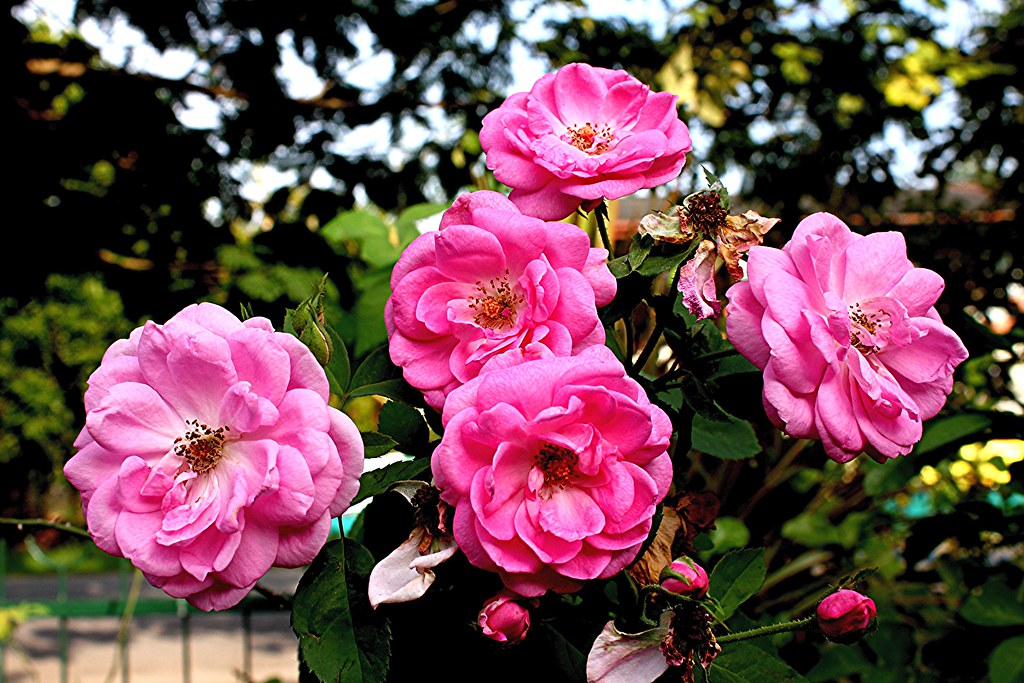Growing Bulgarian roses in temperate climates of Kashmir valley can have significant economic benefits, both for small-scale farmers and larger agricultural producers, officials said.
Dr Anjum Rashid, Floriculturist, Department of Agriculture Kashmir said growing Bulgarian roses in the temperate climates of the valley can be highly beneficial and profitable and also contribute to the beauty and fragrance of the environment.
“The Bulgarian Rose is in high demand globally and growing it in our climates presents an opportunity for our farmers to enter into the international cut-flower and essential oil trade. One litre of rose oil costs about 10 to 12 lakh in the world market,” she said.
Similarly, she said rose water is another product with high domestic demand and small-scale farmers can take advantage of the growing demand in international and domestic markets to sell their roses.
As the Bulgarian rose harvesting has started in Kashmir, a Seed Multiplication Farm in Allowpora area of south Kashmir’s Shopian district has turned out to be a relief for the Bulgarian rose farmers who take their crop to extract rose water there.
These days the seed multiplication farm which is the unique facility set up by the Agriculture Dept. Kashmir remains busy with farmers taking their produce for processing.
Dr Anjum said currently Bulgarian rose is cultivated in Model Floriculture Centre (MFC) Nunner Ganderbal, Lavender Farm Sirhama Bijbehera and SMF Allowpora.
“We collect the Bulgarian roses from all these farms to SMF Allowpora for the distillation process of petals to extract rose water and rose oil,” she said.
All the farmers across the valley including the farmers from southern Kashmir districts take their produce to the same farm for processing purposes. The floriculturist said owing to high market demand they prefer to extract rose water only.
“This year the season is underway and this year so far we have taken some 30-40 quintals of roses and extracted some 2,000 litres of rose water,” she said.
Dr Anjum said that the government-owned facility has turned out to be a relief for the farmers as the distillation process of petals to extract rose water is done free of cost.
“People are not that aware of the Bulgarian roses and its commercial value but we are encouraging farmers to come forward and take it as an entrepreneurship,” she said.
The floriculturist said youth can come forward and make rose gardens and they do not require huge resources for that adding it just needs land and they can take help of the agriculture department.
The floriculturist also said rose cultivation can also generate jobs for the unemployed youth.
She said that the floriculture scheme of the Department of Agriculture Kashmir is bringing revolution in Bulgarian rose cultivation.
The floriculturist said the department also conducts awareness programs and farmers are given free-of-cost plant material and are also given guidance for its propagation.
On the other side she said now people are coming to take the Bulgarian rose as entrepreneurship and many youth have started rose farming.
She said a farmer can plant 50,000 to 60,000 plants in one hectare of land. “One hectare of land can produce approximately 15 lakh flowers. One quintal of rose flower yields 40-50 litres of rose water. The flowers can be used for rose water, rose oil and we can also use the petals,” she said.
Talking about its benefits, she said that in the perfumery industry, roses have long been the main ingredient in luxury perfumes and fragrances, especially the Bulgarian Rose.
“In aromatherapy, the use of essential oils for aromatherapy and healing purposes is a rapidly growing industry. Bulgarian rose oil has been shown to have calming and therapeutic effects and is a popular ingredient in essential oil blends,” Dr Anjum said.
“By growing Bulgarian roses, small-scale farmers can supply the essential oil industry with high-quality rose oil, thus earning extra income,” she said.
In the culinary industry, the Bulgarian rose is also edible and a popular ingredient used in making sweets and jams. “Small-scale farmers can grow Bulgarian roses in temperate climates and sell them to artisanal food markets, thus opening another revenue stream,” the floriculturist said.
previous post

